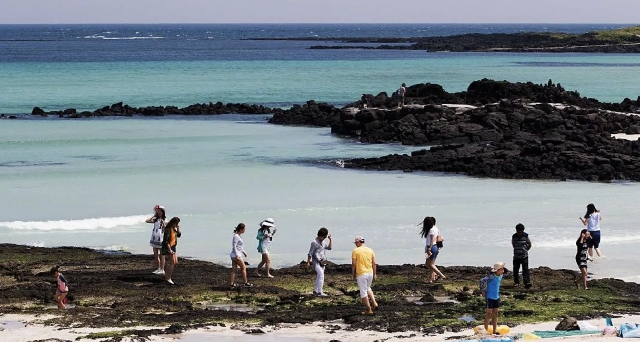South Korea tells tourists on holiday island Jeju to behave
 Getty Images (Pic): The guide is printed in three languages - Chinese, English and Korean
Getty Images (Pic): The guide is printed in three languages - Chinese, English and Korean
Police in Jeju have for the first time released guidelines reminding foreign visitors to behave or face fines, as the South Korean holiday island sees an increasing number of tourists.
Jeju police issued the guide following complaints from locals over foreigners' misbehaviour, including littering and letting children defecate on the street.
The guide - printed in Chinese, English and Korean - is the first of its kind in the country, local police say, and comes during the peak summer season.
Jeju, a volcanic island south of the Korean peninsula, is popular for its beaches, walking trails and windswept mountain views. Foreign visitors also come to Jeju for shopping and gambling.
The guide aims to "prevent misunderstandings due to language and cultural differences and improve foreigners' understanding of Korean culture and laws", said Jeju Police Agency chief Kim Su-young.
An initial eight thousand copies of the guide will be printed and distributed immediately, Kim said.
The guide lists down "minor offences" that are punishable by fines. These include smoking in prohibited areas, littering, jaywalking, drunk and disorderly behaviour, running away from restaurants without paying for meals, urinating or defecating in public, using a fake ID, and trespassing and breaking into empty houses.
First time violators are let off with with a warning, but repeat offenders could be fined by as much as 200,000 won ($143; £106), according to a copy of the guide released by police.
South Korea has seen a strong post-pandemic rebound in tourism. Jeju alone has welcomed seven million visitors so far this year, according to local media.
In 2024, foreign visitors pumped a record 9.26 trillion won into the local economy. Nearly 70% of these visitors visiting Jeju were from China.
The island's crackdown on misbehaviour also highlights how tourism hotspots across Asia have been responding to over-tourism.
Last year, a Japanese town blocked a famous roadside view of Mount Fuji to ward off tourists seeking to take pictures and selfies.
Source: bbc.com
Trending World

Dozens of migrants killed after boats capsize off Italian coast
01:49
Australia and Vanuatu agree to $328m security and business deal
13:30
Melania Trump threatens to sue Hunter Biden for $1bn over Epstein claim
12:54
Cape Verde declares state of emergency after deadly floods
02:24
UK, France and Germany ready to reimpose sanctions on Iran over nuclear programme
02:18
Global plastic talks collapse as countries remain deeply divided
14:42
Suspected French spy arrested in alleged Mali coup plot
14:38
After destroying Libya, Syria, Iraq others… Western nations
14:19
Burkina Faso's junta expels top UN official over child rights report
13:17
4 key takeaways from Ukraine talks in Washington
13:01



